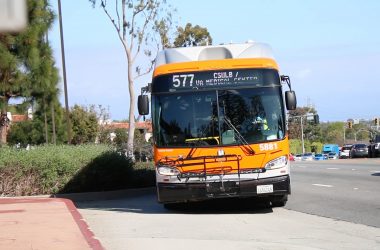Solicitors visit Cal State Long Beach daily and officials are advising students to be aware when engaging with them.
Kelsey Self, a freshman environmental science and policy major, said she wished she had been more cautious three weeks ago when she became a victim of a soliciting scam.
“I should have seen all the signs,” Self said as she looked at a strip of paper that was given to her as a receipt. “The numbers don’t add up. My last sign should have been how much shipping and handling was, which would have been $48.”
The 18-year-old freshman was reading on a grassy area near the bookstore three Mondays ago when approached by a man named Chris, who introduced himself as a CSULB student.
According to Self, he told her he was only a few points away from earning a trip to Australia and he needed to sell a few more magazine subscriptions to travel abroad.
“Out of compassion, I wanted to help him out. I really want to travel as well, so I thought I could get my money back by calling [customer service] and that he could still keep his points,” she said.
Self initially wasn’t interested in making a purchase, but she also did not think “Chris” was trying to scam her. Eventually she did buy two-year subscriptions for Seventeen and National Geographic.
She withdrew cash from an on-campus ATM machine and once she handed $100 over to “Chris,” that was the last she heard from him.
Self called the magazine company’s customer service several times later in the day, only to reach a voice mail box. Through Internet research, she found that others around the country had been scammed by “Rolling Sales Inc.,” the same company “Chris” represented.
Director of Student Life and Development Jeffrey Klaus described Self’s incident as an “occasional” occurrence.
“I’m not hearing [fraud] problems on a daily basis. If we notice a pattern and if we get regular calls, I guarantee you that there’s going to be a step up in enforcement,” he said.
Solicitors who engage in monetary transactions must rent a vendor table through the University Student Union or the University Bookstore in order to legally make transactions on campus.
Solicitors who wish to exercise free speech are considered non-commercial solicitors. According to campus regulations, it is illegal for these types of solicitors to conduct any monetary transactions.
Individuals who wish to engage in non-commercial soliciting must check with Student Life and Development so it can understand the nature of their campus visit.
Once SLD believes individuals are eligible for non-commercial solicitation, a daily visitor sticker is issued, regulations are instructed and solicitors may begin interacting with students.
SLD does not regulate non-commercial soliciting content since individuals have the right to free speech, Klaus said.
Non-commercial solicitors are allowed in most campus areas except parking lots, residential halls, the entrance of the USU, and the corridors in between the psychology building and the library.
According to Klaus, there are some who come on campus to try to “manipulate” the SLD screening process.
“Sometimes individuals will not answer questions truthfully because they do not want to pay a fee to conduct commercial business and will try to pass off as a non-commercial solicitor with intent of making a sale,” Klaus said.
He also reminded students that CSULB is a big campus and sometimes violators can slip away without being noticed.
“We are not perfect,” Klaus said, “but as soon as people alert us, we actively seek [the violators] out.”
Viet Tran, a senior biology student, recalled being approached by several solicitors in the past.
“I’ve read the campus rules on the university Web site. I only stop for solicitors if I see that they have the correct permits or passes given by the school,” Tran said.
If non-commercial solicitors are in violation of campus regulations, they are given a warning and are asked by campus officials to cease any illegal activity. If a warning is ignored, they are asked to leave campus grounds.
CSULB Police Captain Fernando Solorzano said official stay-off orders are only given to individuals who return to campus after being asked leave. Solicitors who are given these orders must stay away from campus grounds for a seven-day period. Any official order violation will result in an arrest.
Solorzano does not see solicitation on campus as a problem.
“The last time an incident similar to [Self’s] was reported about two years ago,” he said, “and it was an off-campus situation; we just picked it up on our radar.”
Solorzano encouraged students to better inform themselves by reading campus regulations and taking simple precautionary steps, such as not giving out sensitive information — social security numbers, driver’s license numbers, credit card information — and to report any suspicious activities to campus police or SLD.
“We obviously want to protect our students as much as we can here, but there’s a fine line with how much we can do. The students have to meet us halfway,” Klaus said.
Self said Rolling Sales Inc. still has not returned her call.
“I don’t expect to see my money again,” she said. “It’s a lesson learned.”



